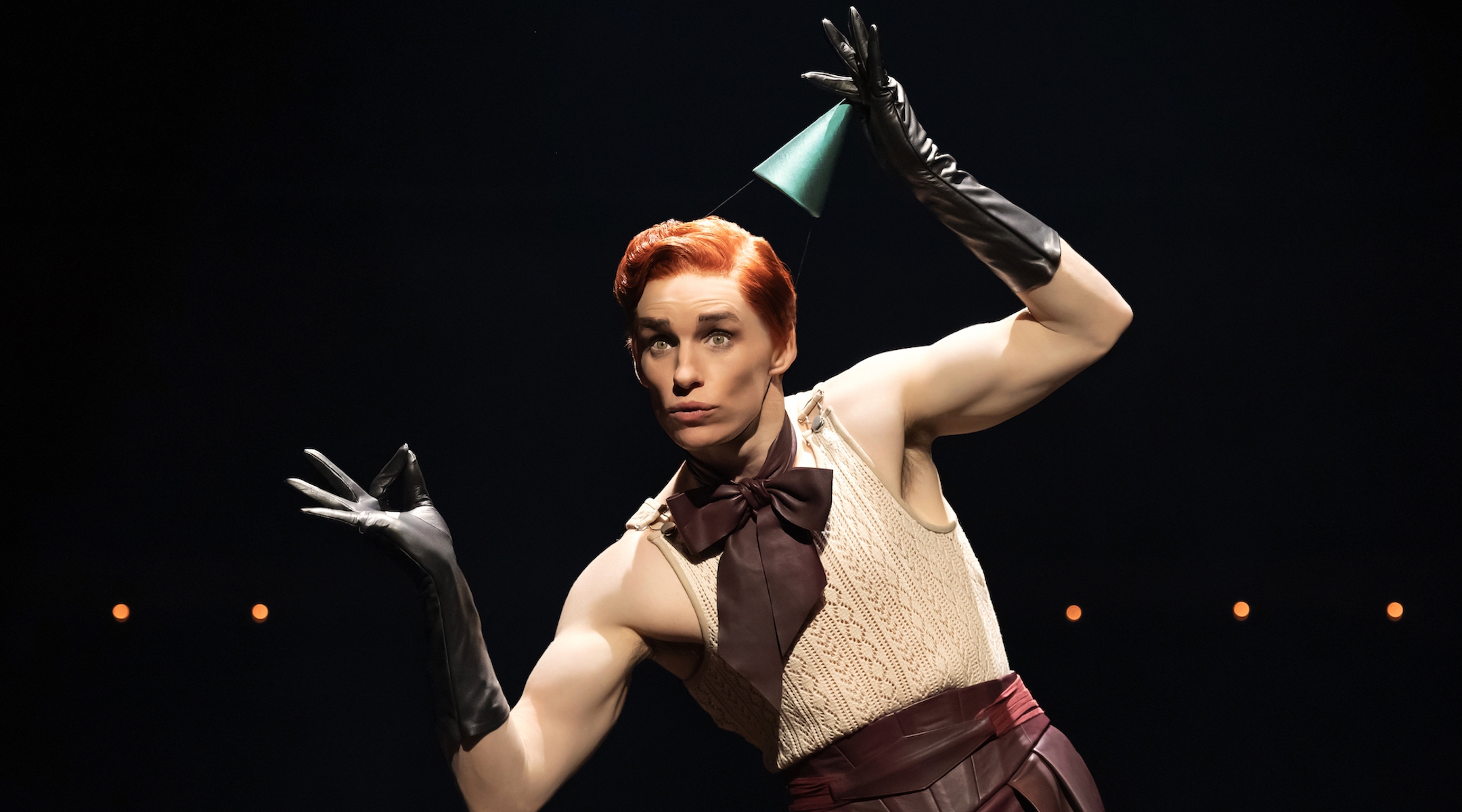(New York Jewish Week) – When guests arrive at the August Wilson Theatre to see the latest revival of “Cabaret” on Broadway, they’re not greeted at the front doors, where they might have entered the last two summers to see “Funny Girl.”
Instead, they’re guided through a dark, narrow side entrance renovated to look like the seedy underground Kit Kat Club of 1930s Berlin, where the show takes place. As ushers hand out free shots of cherry schnapps, guests are welcomed into the theater redecorated to resemble more of a nightclub than a Broadway stage.
The disorientating, dark and fantastical set is a fitting backdrop for the Kander and Ebb musical about the British “good-time gal” Sally Bowles, the ambiguously queer writer Cliff Bradshaw and the rise of Nazism during Germany’s decadent Weimar Republic.
Occasionally, though, the audience can come up for air when the Kit Kat Club scenes are punctuated with the fated love story between Fraulein Schneider (Bebe Neuwirth), a German boarding house owner, and her tenant, Herr Schultz (Steven Skybell), an older Jewish man and luxury fruit importer.
Though the two characters are some of the lesser known roles in the many versions of “Cabaret” — the plot wasn’t even included in the Academy Award-winning 1972 film — the 2024 revival, imported from the West End and directed by Rebecca Frecknall, places them at the emotional heart of the story. Schneider and Schultz briefly become engaged before Schneider backs out, realizing, after a Nazi attends the engagement party, that she can’t marry a Jewish man. The knowledge of what’s to come — which the audience has but the couple does not — hangs heavy.
For Skybell, who in the last eight years has been in three different productions of “Fiddler on the Roof” — on Broadway as Lazar Wolf and off-Broadway as Tevye in both “Fiddler on the Roof in Yiddish” at the National Yiddish Theater Folksbiene and at the Lyric Opera of Chicago — the ability to play an eternally optimistic Jewish man who knows his luck is running out is hard-earned. In the fall, Skybell starred in “Amid Falling Walls at the Folksbiene, a musical that gives life to the songs and poetry written in the Warsaw Ghetto.
“The roles I’ve had the fortune of playing are really deep and investigate what it is to be Jewish in the world. Certainly, playing Herr Schultz right now feels so important — I don’t really identify as a political activist in my life, but I’m feeling more and more called to try and do something and playing Herr Schultz in 2024 is the first step towards really trying to become an active participant in world events,” Skybell told the New York Jewish Week. “The precipice upon which he is standing is the very reason why a Jewish homeland must exist.”
And while this production seems haunted by the attacks on Israel and the subsequent war on Gaza, it isn’t the first time that his performances have been informed by world events offstage.
“When we started ‘Yiddish Fiddler’ in 2018, it really felt like the beginning of shocking antisemitism in Brooklyn, in New York — the Tree of Life shooting [in Pittsburgh] happened while we were doing ‘Yiddish Fiddler.’ It was shocking how antisemitism was making a resurgence in such a way that I hadn’t felt all my life,” Skybell said. “Certainly, Berlin 1930, when just the whiff of Nazism was going on, feels so parallel to what I feel like we’re smelling in 2024 of what could happen, where things might go — and have gone.”
Steven Skybell as Tevye in the 2018 production of Fiddler on the Roof in Yiddish at the National Yiddish Theater Folksbiene. (Lev Radin)
The creators of the 2024 revival, Skybell said, “really highlight the Jewish problem that is in ‘Cabaret.’ They weren’t giving it the short shrift in terms of what the Jewish story is.”
Skybell’s Herr Schultz, who is far afield from the seedy, scandalous dancers at the Kit Kat Club, offers the audience a character to grasp on to. He wants only to fall in love, to be successful and to run his business, which makes him that much more of a heartbreaking character, said the actor. When Herr Schultz meets Bradshaw (Ato Blankson-Wood), who is also staying at the boardinghouse, Schultz wishes him “mazel” — luck — in the new year.
At the end of the show, Schutlz’s bags are packed, his fruit shop vandalized and his wedding called off. He comes to say goodbye to Bradshaw, who heartbreakingly wishes him “mazel” in his next chapter.
Support the New York Jewish Week
Our nonprofit newsroom depends on readers like you. Make a donation now to support independent Jewish journalism in New York.
“In the final scene when Herr Schultz is coming to say goodbye, and that he does bring on his luggage, is just an image that is very resonant for me and I feel like for audience members as well, who just know what it is for a Jewish person to pack their bags, and maybe not know what’s going to happen to their belongings as they embark on a new journey,” Skybell added.
Another scene that sticks with Skybell is when Herr Schultz comes face to face with the Emcee (Eddie Redmayne) — who symbolizes the cynical zeitgeist of a Germany slipping further into facism — the two share a moment of recognition before Schultz walks offstage.

Eddie Redmayne as the Emcee in “Cabaret at the Kit Kat Club” at the August Wilson Theatre. (Marc Brenner)
“In another production, it could come and go very quickly, without a lot of focus on it. This production just gives it the time to exist, acknowledging what is there and what it means for this Jewish character and for the Jews at this time,” Skybell said.
Compared to “Fiddler,” Skybell said, Herr Schultz’s story is in some ways even more excruciating.
“I know that the creatives wrote ‘Fiddler’ after the Holocaust, but we were always reminded that in 1906 Anatevka, we didn’t want to get too involved with the Nazi Final Solution because that I don’t think was even in Tevye’s bandwidth — six million is not even a number he could fathom,” Skybell said. “In terms of Herr Schultz, with the Nazi ideology that was rampant in Berlin at that time and the antisemitism, it’s much more palpable than it would be for Tevye. In that regard, I think he’s more frightened than Tevye is, if he were to admit it to himself.”
Along with director Rebecca Frecknall, Skybell reached out for advice from his old friend Joel Grey who directed him in “Yiddish Fiddler” and who, of course, had his breakthrough as the Emcee in the original 1966 Broadway musical and the 1972 movie, helping cement the show as one of the greats in the 20th-century American theater.
“They both said the same thing, that they felt that Herr Schultz and Schneider are the heart of the musical. It is such a phantasmagoria of sensory overload and dancing and singing that this love story, in some ways, becomes the central story to follow,” Skybell said.
He added that it this is not just because Herr Schultz’s Jewishness makes explicit and tangible the threat of rising Nazi Germany, but also because “in a beautiful way, the older couple are really the are the couple that every audience member can identify with in — we root for them to find love even at this late stage in their lives.”
On April 11, Skybell, the rest of the cast and the audience celebrated Grey’s 92nd birthday by singing to him onstage, where he was also joined by the show’s original composer John Kander. (Fred Ebb, Kander’s longtime professional partner who wrote the lyrics, died in 2004).
“None of us in this current revival would even have a job if it wasn’t for [Grey’s] performance in the original ‘Cabaret.’ His Emcee really galvanized that musical and really set it as an iconic musical — every revival of ‘Cabaret’ is in the wake of Joel Grey,” Skybell said.
As for his own legacy, “If I only ever play Jewish characters for the rest of my life, I would be delighted and I would be honored. I’ve happily been recognized as a Jewish performer. It’s a privilege for me,” he said. “I actually feel now it’s a calling for me to find myself in these stories that have Jewish points of view, because it’s more important now than I think it’s ever been in my life to give voice to the Jewish condition.”









